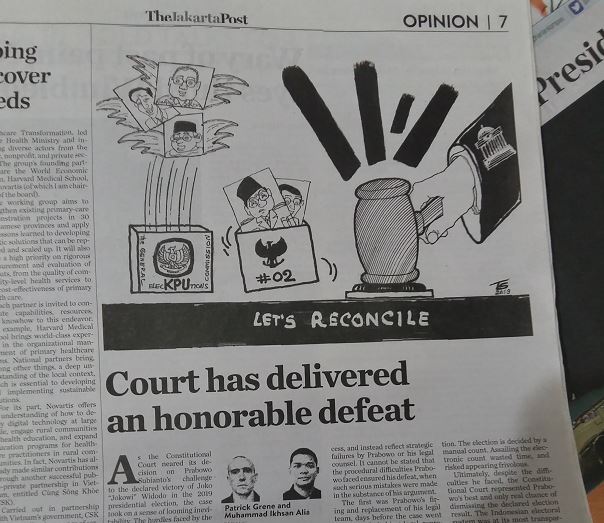Candidacy in the Constitutional Court
Yesterday evening, to nobody’s particular surprise, the Constitutional Court delivered its long-awaited verdict on Prabowo Subianto’s challenge to the declared victory of Joko Widodo in the 2019 presidential election. The court upheld Jokowi’s victory, and condemned as baseless Prabowo’s various charges of electoral manipulation and legal violations by the Jokowi campaign.
These were numerous, and ranged from allegations that Jokowi exerted a sinister influence within the organizations charged with the electoral count to claims that Jokowi’s call for his supporters to wear white shirts on election day amounted to voter intimidation. Prabowo also claimed that Jokowi and Jokowi’s vice-presidential candidate, Ma’aruf Amin, were invalid as candidates. He alleged variously that Jokowi’s campaign had taken funds from the government or from puppet donors operating as a front to allow outsize donations from wealthy individuals or organisations, and that Ma’aruf Amin had failed to divest himself from state-linked business, specifically a subsidiary of the Indonesian National Bank.
At a certain point, the sheer number of different allegations came to seem somewhat desperate, a kitchen-sink approach casting wild aspersions in the hopes that something, anything, might stick. The weakness of Prabowo’s case was highlighted by the descent of his argument into a chaotic shambles, attacking the mechanical counting process, which does not determine the election, and alleging irregularities in voter recordation in areas that he himself had won.
That said, the Constitutional Court process seemed a challenging arena for him from the start. The procedural structure makes contending an election result a troublesome process. This may be for the best, as it is hardly desirable that each and every election wind up in the court, and the difficulties failed to dissuade Prabowo in this instance, despite the fact that his vote share was some ten percent below Jokowi’s.
Nonetheless, the challenges were noteworthy. The sheer quantity of votes that had to be disqualified was staggering, given the size of the electorate, and especially, in this case, given Jokowi’s wide margin of victory. Assailing them on an individual basis was necessarily impossible, given the impossible amount of work this would entail.
Perhaps in light of this, Prabowo initially attempted to challenge the results of the election on the grounds that they were so rife with corruption as to be a structural, systematic, and massive violation (TSM, in the popular Indonesian acronym). He demanded accordingly that the election result be abandoned entirely, declared void.
However, midway through his case, he changed his tune to demand instead that the Constitutional Court evaluate the numbers presented by region, effectively upholding the election itself and simply reevaluating the allocation of votes to candidates. This reversal regarding the validity of the election presumably reflected his realization that the vast web of corruption he had accused Jokowi of weaving did not exist, or at the very least would be impossible to prove.
However, abandoning his main argument midway through the case indicated a peculiar failure to fully consider the realities involved, and suggested a willingness to engage the court in unnecessary contemplation of irrelevant issues. This seemed like a frivolous use of the court’s time, and highlighted the multiplicity of Prabowo’s allegations while undermining their appearance of substantiality.
Prabowo’s case contained several other mistakes or inconsistencies, for example calling for recounts while failing to articulate a feasible means of doing so, as he also demanded the dismantling of the General Elections Commission, or KPU. The only proffered alternative, using the General Election Supervisory Board, or BAWASLU, verged on the nonsensical, as the counting process lies without their stated responsibilities, and using them would demand immense restructuring, reallocation of funds, and a fundamental change in purpose.
My article examining the case and the court process appeared in today’s Jakarta Post, and is available online at: www.thejakartapost.com/news/2019/06/28/court-has-delivered-honorable-defeat.html
As the case matured, it became increasingly apparent that Prabowo’s efforts were hopeless, and that the decision could not help but support Jokowi’s victory. Prabowo, who mobilized supporters to deadly effect earlier in the election process, with riots following the declaration of the election result in May, encouraged his followers to mass in the area around the Constitutional Court.
Relatively few manifested, however, and the police effectively corralled those who did show up in cordoned-off areas removed from the court building itself. Furthermore, there was a noticeable lack of the vitriol that marked their attitude in May. The violence in which they had previously indulged was not to be seen.
In part this may have reflected a growing acceptance of the result, with the relatively slow-moving process allowing time for the likelihood of defeat to sink in rather than falling with the hammer-blow of the election result, although the latter was almost equally foretold. Additionally, some may have lost their taste for protest after the horrors of May. And finally, Prabowo’s summons this time lacked the explicit call to contest the process and dispute the result.
However, it also likely reflects the great trust Indonesians place in the Constitutional Court. This is to a great extent justified. The court is structured so as to be essentially immune to political influence, with the nine justices appointed equally by the executive, legislative, and judicial branches, with the nomination process involving a rigorous examination of each candidate’s background and qualifications. This intensely meritocratic process frankly puts to shame the methods used by other nations for appointing their respective high courts. The Indonesian public thus justly award the court a great degree of pride and respect.
The decision thus appears likely to help unite Indonesians, who have been torn apart by the contentious election process so far. If so, the nation may breathe a collective sigh of relief, as peace and reconciliation will be intensely welcome after the intensity of the hostilities this year.
